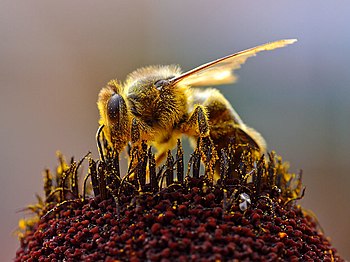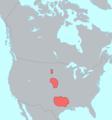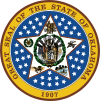The Oklahoma Portal Oklahoma (/ˌoʊkləˈhoʊmə/ ⓘ OHK-lə-HOH-mə; Choctaw: Oklahumma, pronounced [oklahómma]; Cherokee: ᎣᎧᎳᎰᎹ, Okalahoma, pronounced [ògàlàhǒːmã́]) is a landlocked state in the South Central region of the United States. It borders Texas to the south and west, Kansas to the north, Missouri to the northeast, Arkansas to the east, New Mexico to the west, and Colorado to the northwest. Partially in the western extreme of the Upland South, it is the 20th-most extensive and the 28th-most populous of the 50 United States. Its residents are known as Oklahomans and its capital and largest city is Oklahoma City. The state's name is derived from the Choctaw words okla, 'people' and humma, which translates as 'red'. Oklahoma is also known informally by its nickname, "The Sooner State", in reference to the Sooners, settlers who staked their claims in formerly American Indian-owned lands until the Indian Appropriations Act of 1889 authorized the Land Rush of 1889 opening the land to white settlement. With ancient mountain ranges, prairie, mesas, and eastern forests, most of Oklahoma lies in the Great Plains, Cross Timbers, and the U.S. Interior Highlands, all regions prone to severe weather. Oklahoma is at a confluence of three major American cultural regions. Historically, it served as a government-sanctioned territory for American Indians moved from east of the Mississippi River, a route for cattle drives from Texas and related regions, and a destination for Southern settlers. There are currently 26 spoken in Oklahoma. According to the 2020 U.S. census, 14.2 percent of Oklahomans identify as American Indians, the highest indigenous population by percentage in any state. A major producer of natural gas, oil, and agricultural products, Oklahoma relies on an economic base of aviation, energy, telecommunications, and biotechnology. Oklahoma City and Tulsa serve as Oklahoma's primary economic anchors, with nearly two-thirds of Oklahomans living within their metropolitan statistical areas. (Full article...) Selected article -The Comanche /kəˈmæntʃi/ or Nʉmʉnʉʉ (Comanche: Nʉmʉnʉʉ, "the people") is a Native American tribe from the Southern Plains of the present-day United States. Comanche people today belong to the federally recognized Comanche Nation, headquartered in Lawton, Oklahoma. The Comanche language is a Numic language of the Uto-Aztecan family. Originally, it was a Shoshoni dialect, but diverged and became a separate language. The Comanche were once part of the Shoshone people of the Great Basin. (Full article...)Spotlight city - Ardmore is the county seat of Carter County, Oklahoma, United States. The population was 24,725 at the time of the 2020 census, a 1.8% increase over the 2010 census figure of 24,283. The Ardmore micropolitan statistical area had an estimated population of 48,491 in 2013. Ardmore is 90 miles (140 km) from both Oklahoma City and Dallas/Fort Worth, Texas, at the junction of Interstate 35 and U.S. Highway 70, and is generally considered the hub of the 13-county region of South Central Oklahoma, also known by state tourism pamphlets as "Chickasaw Country" and previously "Lake and Trail Country". It is also a part of the Texoma region. Ardmore is situated about 9 miles (14 km) south of the Arbuckle Mountains and is located at the eastern margin of the Healdton Basin, one of the most oil-rich regions of the United States. Ardmore was named after the affluent Philadelphia suburb and historic PRR Main Line stop of Ardmore, Pennsylvania, which was named after Ardmore in County Waterford, Ireland, by the Pennsylvania Railroad in 1873. The name "Ardmore" is Irish for high grounds or hills. (Full article...)Selected pictureFeatured content
Featured lists: Oklahoma birds • Tallest buildings in Tulsa • List of tallest buildings in Oklahoma City • List of birds of Oklahoma • List of Oklahoma Sooners football seasons • List of Oklahoma Sooners head football coaches • List of Oklahoma Sooners in the NFL Draft State facts
State symbols
Selected biography -Ronald William Howard (born March 1, 1954) is an American director, producer, screenwriter, and actor. Howard started his career as a child actor before transitioning to directing films. Over his six decade career, Howard has received two Academy Awards, four Emmy Awards, two Golden Globe Awards, and a Grammy Award. He was awarded the National Medal of Arts in 2003 and was inducted into the Television Hall of Fame in 2013. Howard has two stars on the Hollywood Walk of Fame for his contributions in film and television. Howard first came to prominence as a child actor, acting in several television series before gaining national attention for playing young Opie Taylor, the son of Sheriff Andy Taylor (played by Andy Griffith) in the sitcom The Andy Griffith Show from 1960 through 1968. During this time, he also appeared in the musical film The Music Man (1962), a critical and commercial success. Howard was cast in one of the lead roles in the influential coming-of-age film American Graffiti (1973), and became a household name for playing Richie Cunningham in the sitcom Happy Days (1974–1980). He starred in the films The Spikes Gang (1974), The Shootist (1976), and Grand Theft Auto (1977), the latter being his directorial film debut. (Full article...)Did you know -
General images -The following are images from various Oklahoma-related articles on Wikipedia.
Related portalsWikiprojects
Things you can do
Oklahoma topicsCategoriesNew articlesThis list was generated from these rules. Questions and feedback are always welcome! The search is being run daily with the most recent ~14 days of results. Note: Some articles may not be relevant to this project.
Rules | Match log | Results page (for watching) | Last updated: 2024-04-26 21:42 (UTC) Note: The list display can now be customized by each user. See List display personalization for details.
Associated WikimediaThe following Wikimedia Foundation sister projects provide more on this subject:
Discover Wikipedia using portals
|



















![Image 17Cartoonist's rendering of Theodore Roosevelt's initial reaction to the Oklahoma Constitution.[needs context] (from History of Oklahoma)](https://upload.wikimedia.org/wikipedia/en/thumb/2/28/Teddyrooseveltoklahomaconstitution.png/120px-Teddyrooseveltoklahomaconstitution.png)

































